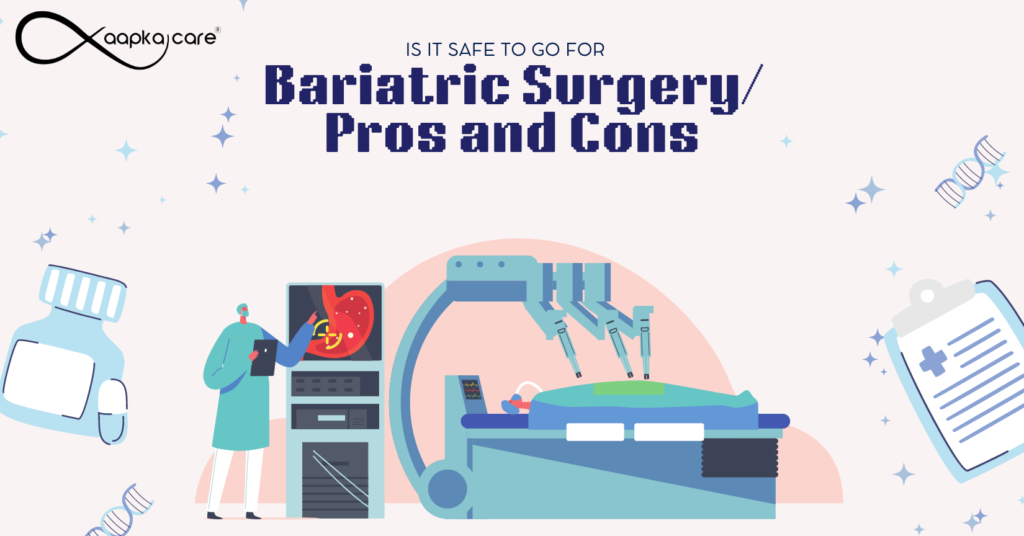
Being obese can be a very frustrating struggle. You might have made innumerable attempts at diets and workout regimens, but the weight always seems to sneak back on. You may be thinking about bariatric surgery if you want a longer-term fix. Is it safe, though? What are the benefits and drawbacks? This in-depth manual will dig into the realm of bariatric surgery, examining its efficacy, its drawbacks, and suitability for you.
Bariatric surgery: What is it?
Bariatric surgery, sometimes referred to as weight loss surgery, is a type of surgery used to help people reduce weight who suffer from extreme obesity. It functions by changing the digestive tract to reduce the amount of food consumed or absorbed. Bariatric surgery comes in a variety of forms, each with an own methodology:
Gastric bypass: The most prevalent type of bariatric surgery is the gastric bypass. Bypassing the majority of the stomach and the first section of the small intestine, a little pouch is formed in the stomach and connects straight to the small intestine. This lowers the quantity of food you can consume and the quantity of calories your body takes in.
Sleeve Gastrectomy: This technique creates a stomach pouch fashioned like a sleeve by removing a major section of the stomach. This encourages feelings of fullness and limits the quantity of food you can eat.
Adjustable Gastric Band: An inflatable band is placed around the upper part of the stomach, creating a small pouch. The band can be adjusted to control the size of the pouch and the amount of food that can pass through.
Biliopancreatic Diversion with Duodenal Switch (BPD-DS): This is a complex surgery that involves bypassing most of the stomach and small intestine. It’s typically reserved for people with very severe obesity or those who haven’t had success with other types of bariatric surgery.
Pros of Weight Loss Surgery
For those who are extremely obese, bariatric surgery has the potential to change their lives. Here are a few possible advantages:
Significant Weight decrease: The most successful treatment for obesity is bariatric surgery, which results in a significant and long-lasting decrease of weight. According to studies, bariatric surgery patients can reduce their extra weight by up to 70%.
Improved Health: Type 2 diabetes, heart disease, sleep apnea, high blood pressure, and other conditions are all significantly increased by obesity. Bariatric surgery can lead to a longer and healthier life by dramatically improving or even reversing certain diseases.
Better Mobility and Quality of Life: Losing weight can significantly increase your range of motion and make daily tasks easier. It can also improve your general quality of life, confidence, and sense of self-worth.
Decreased Medication Dependency: Bariatric surgery-acquired weight loss can frequently assist in lowering or doing away with your need for prescription drugs for illnesses linked to your weight.
Cons of Gastric Surgery
Like any surgery, bariatric surgery is a major procedure with certain dangers and drawbacks. Here’s something to think about:
A Serious Procedure: Bariatric surgery is a serious operation that entails a general anaesthetic and has a risk of bleeding, clotting, and infection.
Lifelong Dedication: Although bariatric surgery is a useful tool for weight loss, it is not a miracle cure. For the best possible health outcomes and to sustain your weight loss, you’ll need to make long-term adjustments to your food and exercise routine.
Nutritional Deficiencies: Your body may have trouble absorbing certain nutrients if you have certain forms of bariatric surgery. To make sure you’re getting the vitamins and minerals you need, you might need to take supplements for the rest of your life.
Dumping Syndrome: After consuming fatty or sugary foods, this typical side effect might result in cramping, nausea, vomiting, and diarrhoea. It happens when food enters the small intestine from the pouch too soon.
Psychological Effects: Bariatric surgery can involve a big transition, and some patients may go through mental difficulties like anxiety, depression, or problems with their body image. Having a solid support network in place is essential for overcoming these possible emotional obstacles.
Do You Need Bariatric Surgery?
Making the decision to have bariatric surgery is serious and should not be done hastily. When deciding if this is the best course of action for you, take into account the following factors:
Body Mass Index (BMI): Those with a BMI of 40 or higher, or a BMI of 35 or higher with a significant weight-related medical problem, are typically candidates for bariatric surgery.
History of Weight Loss Attempts: Before being evaluated for surgery, you will probably need to show that you have made repeated attempts to lose weight through diet and exercise regimens, all of which have ended in failure.
General Health: To ascertain whether you’re a good candidate for surgery, your general health as well as the existence of any underlying medical issues will be assessed.
Psychological Readiness: A substantial commitment to lifestyle modifications is necessary for bariatric surgery. You should be ready to permanently change the way you exercise and eat, and you should have a solid support network in place to help you deal with any emotional difficulties that may surface.
Who Doesn’t Need to Think About Bariatric Surgery?
Although bariatric surgery has numerous advantages, not everyone is a good candidate for it. The following list of factors could make someone an unsuitable candidate:
Uncontrolled medical conditions: You may need to take care of uncontrolled mental or medical conditions before thinking about surgery.
Impractical expectations: It takes time to recover from bariatric surgery. It’s a tool to aid in weight loss, but it calls for sustained effort and adjustments to lifestyle.
Alcohol or drug abuse: To guarantee a good outcome from surgery, you should take care of any alcohol or drug misuse problems you may have.
Pregnancy: Bariatric surgery is not recommended during pregnancy or while breastfeeding.
Getting Ready for Weight Loss Surgery
Should you and your physician determine that bariatric surgery is the best option for you, a thorough pre-operative procedure will be followed. This could include:
Nutritional counselling: Following surgery, a nutritionist will advise you on appropriate eating practices and dietary modifications.
Psychological evaluation: A mental health specialist will determine whether you are emotionally and psychologically prepared for the changes that bariatric surgery will bring about.
Exercise schedule: Creating an exercise schedule is essential for successful weight loss over the long run. It’s likely that you’ll collaborate with a medical expert to design a secure and efficient workout regimen.
Medical testing: To evaluate your general health and make sure you’re a good candidate for surgery, a number of tests will be performed.
Post-Bariatric Surgery Recuperation
The precise procedure used will determine how long it takes to recover from bariatric surgery. Generally speaking, you should plan on spending a few days in the hospital and feeling uncomfortable as your body heals. For the best long-term outcomes and a speedy recovery, it’s imperative that you adhere to your doctor’s recommendations about nutrition, exercise, and medications.
Long-Term Monitoring Services
It’s crucial to schedule routine follow-up visits with your doctor after bariatric surgery. During these appointments, your doctor will be able to track the progress of your weight loss efforts, look for any nutritional shortages, and handle any potential consequences. A dietitian will probably still provide you with advice and support, and you might find it helpful to attend a support group to meet other people who have had bariatric surgery.
The Price of Weight Loss Surgery
The type of operation, where you live, the surgeon’s fee, and hospital costs are some of the variables that can affect the cost of bariatric surgery. Bariatric surgery is usually covered by insurance if certain requirements are met. It’s critical to speak with your insurance company to find out exactly what is covered and how much you will have to pay out of pocket.
To sum it up, for those with extreme obesity, bariatric surgery can be a life-changing procedure. Significant weight loss, better health outcomes, and an enhanced quality of life are all possible results. But since it’s a big choice, thought must be given to it. Weighing the risks and benefits, understanding the long-term commitment involved, and discussing your options with a qualified healthcare professional are crucial steps in determining if bariatric surgery is the right path for you.



